Unresolved questions of Holyrood's Alex Salmond saga
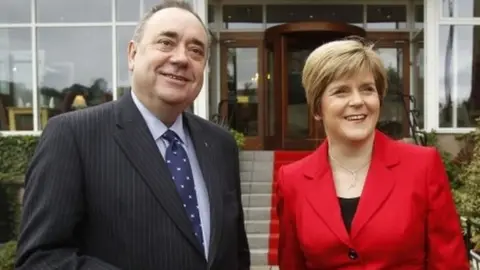 BBC
BBC"The motion is therefore not agreed".
With those banal few words from Holyrood's presiding officer, the Conservatives' attempt to topple Nicola Sturgeon as first minister ended in failure.
She comfortably survived their no confidence motion over the Scottish government's mishandling of harassment complaints against Alex Salmond by 65 votes to 31, with 27 abstentions.
It was 23 March 2021. The same day the Holyrood inquiry into the scandal published its report which found the government's processes "seriously flawed".
Ms Sturgeon went on to win the SNP a fourth consecutive term in office at Holyrood, but that did not draw the final line under this extraordinary episode.
Despite three inquiries, two court cases and a Scottish general election since the controversy became public in 2018, some issues remain to be resolved.
Six months on from the parliamentary drama, BBC Scotland's political editor Glenn Campbell takes a look at some of the outstanding questions.

Has complaints handling got any better?
That's hard to tell because there have not been any further harassment complaints to the Scottish government since the Alex Salmond case.
It remains open to them to re-investigate the original complaints against him but they say there has been no request for them to do so.
A review of their complaint handling process by Laura Dunlop QC recommended an overhaul which is now under way.
The government has given itself until the end of this year to develop a new system with independent investigation and adjudication of any complaints against ministers and former ministers.
In the meantime, the process developed in response to the #MeToo movement in 2017 remains in place.
Mr Salmond successfully challenged it in court because the investigating officer in his case had prior contact with the complainers.
The government says any further application of the procedure would avoid that mistake, and take into account other points of criticism.
Women's rights campaigners believe the controversy surrounding the Salmond case will have shattered the confidence of potential complainers to come forward.
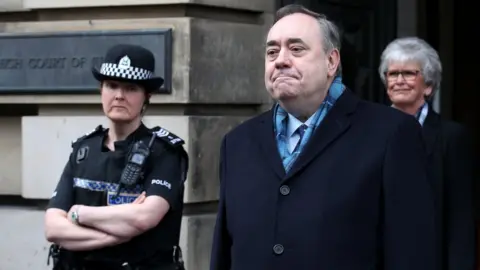 PA Media
PA MediaWas anyone sacked over the mistakes made?
Not as far as we know.
The Holyrood inquiry unanimously agreed that "those responsible should be held accountable" and singled out Scotland's top civil servant Leslie Evans for particular criticism.
Six months on, she remains the permanent secretary in the Scottish government - although she is due to leave that post in the coming months when her extended term comes to an end.
The government says both the permanent secretary and the first minister have taken responsibility for failings and apologised to the complainers.
A spokesperson said: "The Scottish government takes a collective responsibility for the issues that arose during this case. This is not about blaming individuals."
The Scottish government has made some changes to its management structure and its director of people, Barbara Allison - who had to correct the evidence she gave to the Holyrood inquiry - has retired.
The first minister has replaced Liz Lloyd as her chief of staff, and given her a new role as a strategic adviser instead.
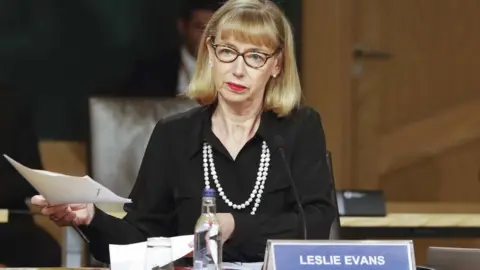 Scottish Parliament
Scottish ParliamentWas an official found to have improperly shared the name of a complainer?
That question was left hanging after James Hamilton published his report into the first minister's handling of the Salmond complaints.
The headline from the Hamilton inquiry was that Nicola Sturgeon had not broken the code of conduct for ministers. However, there were further points of interest in the detail of his findings.
He was told by Alex Salmond's former chief of staff, Geoff Aberdein, that a senior official in the Scottish government had discussed the complaints with him in March 2018 and revealed the identity of one of the complainers.
That version of events is disputed by the senior official and indeed the first minister, but Mr Hamilton - a former chief prosecutor in Ireland - found Mr Aberdein's account "credible".
Alex Salmond formally complained to the Scottish government about the conduct of the official.
Six months on, that complaint seems to have been rejected. A government spokesperson told the BBC it had been "investigated fully and no evidence was found to support the allegations of a leak from the Scottish government".
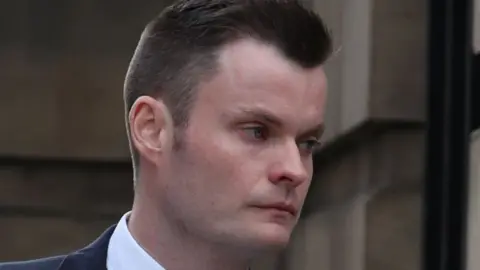 PA Media
PA MediaHow are the other leak inquiries going?
News that harassment complaints against Alex Salmond were being investigated by the Scottish government was leaked to the Daily Record in August 2018.
Investigations by the Scottish government and the information commissioner's office failed to identify the source, although the ICO was "sympathetic" to the idea it had come from within government.
In the past week, Police Scotland confirmed they are now investigating two complaints of "potential unlawful disclosure" of information.
It's understood the first complaint is about the Record story and the second centres on the publication of the findings of the Scottish government's investigation in a new book.
Break Up by journalists David Clegg and Kieran Andrews gives more detail of the allegations made by two female civil servants and reveals which of the complaints were upheld.
These findings were later set aside when Mr Salmond successfully challenged the complaint handling process in court. It was found to be "tainted by apparent bias".
He was later acquitted of all criminal charges in a High Court trial.
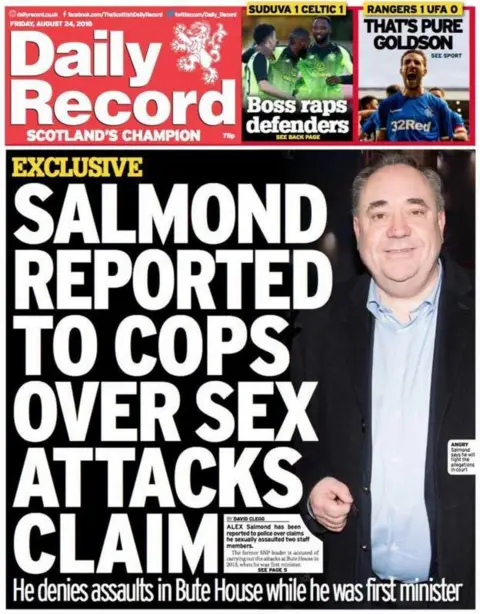 Daily Record
Daily RecordHas the harassment scandal changed our politics?
Yes. I think it has had an impact.
There was a poisonous atmosphere in the Scottish Parliament in the final weeks of the 2016-2021 session and some of that animosity lingers.
That is one reason the SNP formed a partnership government with the Greens after the election, to insulate themselves from opposition ambush.
The SNP-Green majority makes the job of the Holyrood opposition harder.
The Salmond saga has also caused a lasting rift in the SNP and the wider independence movement.
Much of the pro-Salmond faction has joined him in the Alba Party, although there are some sympathetic to him, including MPs Joanna Cherry and Angus MacNeil, who remain in the SNP.
Alba are challenging the SNP over its independence strategy and on other policy issues including reform of the Gender Recognition Act and the procurement of CalMac ferries.
 PA Media
PA MediaWasn't Alex Salmond going to sue for damages?
Yes. Alex Salmond accepted the outcomes of the various inquiries but said he would be taking further legal action.
We were told in March he would sue the Scottish government for an unspecified amount of damages.
There hasn't been any update on that from Mr Salmond or his solicitor but when I asked the Scottish government if an action was under way, their answer consisted of just one word: "No."
Whether or not that wrangle still lies ahead, Mr Salmond is understood to be writing a score-settling book which the SNP veteran Jim Sillars has predicted will have a "volcanic effect" on the party.
Is that everything?
No. Far from it.
- The dual role of the Lord Advocate, who sits in the Scottish government as its principal legal adviser and heads up the independent prosecution service, is under formal review by Scottish ministers.
- Change to the Lord Advocate's role would require legislation at Westminster, which could also provide an opportunity to strengthen Holyrood's ability to scrutinise the Scottish government and others.
- The Crown Office says complaints from MSPs Murdo Fraser and Jackie Baillie about the evidence given under oath to the Holyrood inquiry by SNP chief executive Peter Murrell remain "under consideration".
- The police have not yet resolved how text messages in which Mr Murrell referred to "pressurising" officers investigating Alex Salmond were leaked to the former justice secretary, Kenny MacAskill.
- A complaint about the QC Gordon Jackson, who was filmed discussing his defence of Alex Salmond on a Scotrail train has still to be resolved by the legal authorities.
- The Holyrood inquiry convenor Linda Fabiani has called for a review of the code of conduct for MSPs after evidence to and decisions by the committee were leaked to the media.
- The first minister is expected to review the code of conduct for all ministers once a new harassment complaints procedure is in place, with James Hamilton suggesting some conduct rules for ministers might be extended to special advisers.
